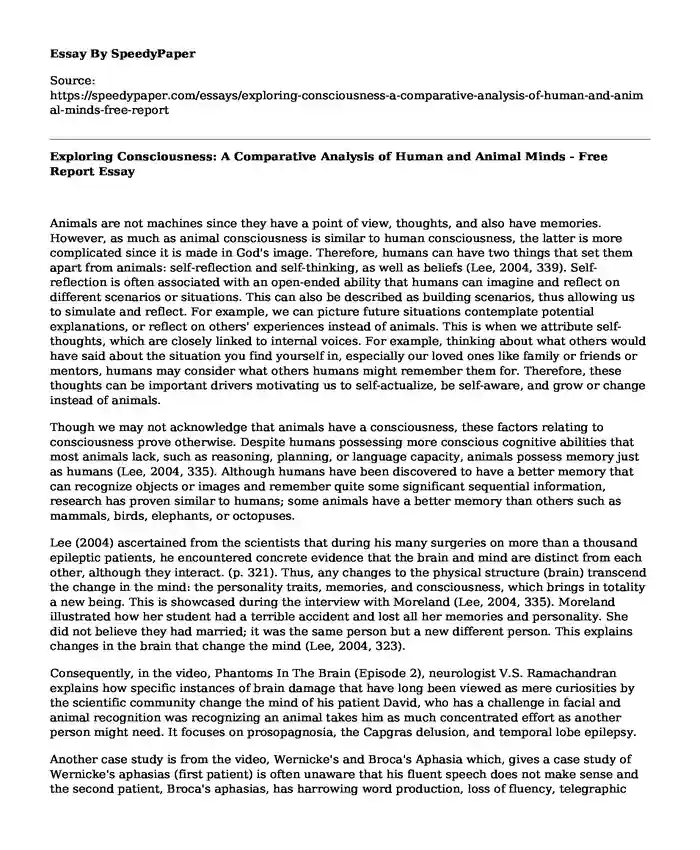
| Essay type: | Analytical essays |
| Categories: | Animals Human |
| Pages: | 3 |
| Wordcount: | 629 words |
Animals are not machines since they have a point of view, thoughts, and also have memories. However, as much as animal consciousness is similar to human consciousness, the latter is more complicated since it is made in God's image. Therefore, humans can have two things that set them apart from animals: self-reflection and self-thinking, as well as beliefs (Lee, 2004, 339). Self-reflection is often associated with an open-ended ability that humans can imagine and reflect on different scenarios or situations. This can also be described as building scenarios, thus allowing us to simulate and reflect. For example, we can picture future situations contemplate potential explanations, or reflect on others' experiences instead of animals. This is when we attribute self-thoughts, which are closely linked to internal voices. For example, thinking about what others would have said about the situation you find yourself in, especially our loved ones like family or friends or mentors, humans may consider what others humans might remember them for. Therefore, these thoughts can be important drivers motivating us to self-actualize, be self-aware, and grow or change instead of animals.
Though we may not acknowledge that animals have a consciousness, these factors relating to consciousness prove otherwise. Despite humans possessing more conscious cognitive abilities that most animals lack, such as reasoning, planning, or language capacity, animals possess memory just as humans (Lee, 2004, 335). Although humans have been discovered to have a better memory that can recognize objects or images and remember quite some significant sequential information, research has proven similar to humans; some animals have a better memory than others such as mammals, birds, elephants, or octopuses.
Lee (2004) ascertained from the scientists that during his many surgeries on more than a thousand epileptic patients, he encountered concrete evidence that the brain and mind are distinct from each other, although they interact. (p. 321). Thus, any changes to the physical structure (brain) transcend the change in the mind: the personality traits, memories, and consciousness, which brings in totality a new being. This is showcased during the interview with Moreland (Lee, 2004, 335). Moreland illustrated how her student had a terrible accident and lost all her memories and personality. She did not believe they had married; it was the same person but a new different person. This explains changes in the brain that change the mind (Lee, 2004, 323).
Consequently, in the video, Phantoms In The Brain (Episode 2), neurologist V.S. Ramachandran explains how specific instances of brain damage that have long been viewed as mere curiosities by the scientific community change the mind of his patient David, who has a challenge in facial and animal recognition was recognizing an animal takes him as much concentrated effort as another person might need. It focuses on prosopagnosia, the Capgras delusion, and temporal lobe epilepsy.
Another case study is from the video, Wernicke's and Broca's Aphasia which, gives a case study of Wernicke's aphasias (first patient) is often unaware that his fluent speech does not make sense and the second patient, Broca's aphasias, has harrowing word production, loss of fluency, telegraphic speech, difficulties with production and comprehension of syntax, and painfully aware of their problem.
Subsequently, the video, Capgras' Delusion Patient, shows how David got an accident leading to a brain condition called Capgras' delusion, which is presumably caused by impaired connections between the visual areas of the temporal lobe and the amygdala in the brain leading to the change in the mind where we see the consequences of reduced emotional representation associated with visual inputs, that is, he does not recognize his parents through facial recognition unlike before the accident. However, he does recognize them by voice. Meaning some damaged connection in the brain changes his memory and personality.
Reference
Strobel, L. (2004). The case for a Creator: A journalist investigates scientific evidence that points toward God. Zondervan.
Cite this page
Exploring Consciousness: A Comparative Analysis of Human and Animal Minds - Free Report. (2023, Dec 19). Retrieved from https://speedypaper.com/essays/exploring-consciousness-a-comparative-analysis-of-human-and-animal-minds-free-report
Request Removal
If you are the original author of this essay and no longer wish to have it published on the SpeedyPaper website, please click below to request its removal:
- Story About My Life - Personal Essay Example
- Free Essay on Women of Today
- HRM Essay Sample: The Role of the Organizational Control System on the Performance Outcome
- Medical Essay Sample: Law and Ethics
- Free Essay Example - Geographical area
- Free Essay. Women Abuse During the 19th Century in "Oliver Twist" and "Hard Times."
- Essay Example: Retrieving Memories from Long-Term Storage
Popular categories




